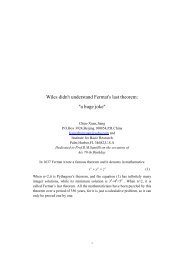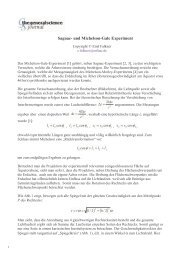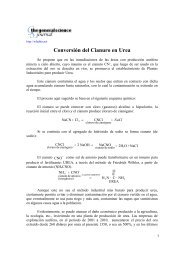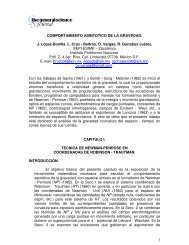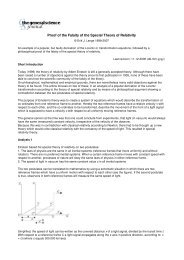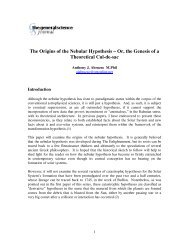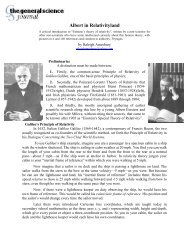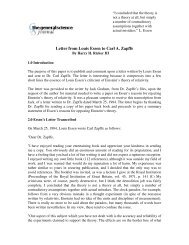MAGNETISM DURING THE SEVENTEENTH CENTURY HH Ricker III
MAGNETISM DURING THE SEVENTEENTH CENTURY HH Ricker III
MAGNETISM DURING THE SEVENTEENTH CENTURY HH Ricker III
Create successful ePaper yourself
Turn your PDF publications into a flip-book with our unique Google optimized e-Paper software.
Unfortunately, there was a grain of truth in Bacon’s criticisms, which was best revealed when he<br />
said of Gilbert, that he has “not unscientifically introduced the question of magnetic force” but<br />
that “he has himself become a magnet; that is he has ascribed too many things to that force, and<br />
built a ship out of a shell”. Here Bacon means that Gilbert’s magnetic philosophy overreaches<br />
what can be proved by his experimental demonstrations. Frankly, one can see why this criticism<br />
made sense. The idea that the magnetic force of mother earth caused it’s rotation seems to be a<br />
pure Copernican fantasy. The arguments presented to support it were weak and the connection to<br />
the demonstration experiments that Gilbert claimed proved it were unconvincing.<br />
On the other hand, Bacon resisted the thesis that the earth was fundamentally magnetic. Today<br />
this seems absurd, and totally hardheaded, because the discovery of the magnetic dip offered<br />
indisputable proof of it. But, Bacon seems to have objected fundamentally to the idea that the<br />
earth had a soul or animate force within it, which was the source of it’s Copernican movements;<br />
ie, rotation and revolution. When this idea was extended to the entire universe so that all the<br />
planets, moons, and stars had animate souls, we can see why Bacon opposed Gilbert’s magnetic<br />
philosophy.<br />
Another reason is that Gilbert’s theory of magnetism is fundamentally Aristotelian. When we<br />
examine it carefully, we see that essentially it is an immaterialist theory of secondary occult<br />
qualities. As presented by Gilbert, it is greatly enhanced by the fundamental idea of the orbitus<br />
virtus or sphere of influence, and his magnetic demonstrations which clearly show how this<br />
magnetic influence is propagated and acts across space. But, his rudimentary field theory was<br />
still Aristotelian in its vocabulary, and maintained the fundamental idea of the form. What<br />
Gilbert contributed was a series of demonstrations combined with an attempt to develop a new<br />
magnetical vocabulary. Gilbert’s new magnetic vocabulary was excellently suited to his<br />
rudimentary field theory, but when he sought to discuss the fundamental nature of magnetism, he<br />
was forced to return to the old fashioned concepts of the scholastics, which Bacon sought to<br />
overthrow.<br />
Ultimately Bacon opposed Gilbert’s ideas because Gilbert was fundamentally out of tune with<br />
the new scientific philosophy advocated by Bacon. Gilbert’s methods were old fashioned. He<br />
expressed himself in terms that were fundamentally scholastic and Aristotelian. This was the<br />
approach which Bacon sought to supplant. Hence, Gilbert’s work was flawed and provided an<br />
example of bad philosophical method. The result of Bacon’s polemic was unfortunate. In<br />
England Gilbert’s magnetical philosophy didn’t take hold. The result was a rising interest in<br />
mechanical and corpuscular theories of magnetism, consistent with the mechanical theories of<br />
electricity. This gives us insight as to why Gilbert’s experimental work in electricity was fruitful.<br />
It was based on a materialistic effluvial theory. His immaterial magnetic theory was stillborn,<br />
and we should not be surprised that magnetic science makes little progress for another two<br />
hundred years.<br />
It is ironic that the publication of On The Magnet stimulated English interest in materialistic<br />
theories of magnetism. This was clearly a reaction against the traditions of natural magic and<br />
aristotelian philosophy. The new effluvial theories of magnetism are clearly a return to the<br />
theories of Empedocles, Democritus, Epicurus, and Lucretius. These theories were clearly<br />
doomed from the beginning because the experimental facts were inconsistent with them. Gilbert



